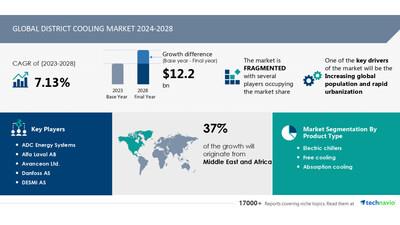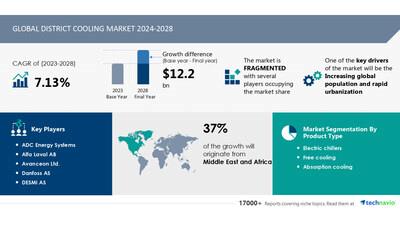
District Cooling Market To Grow By USD 12.2 Billion From 2024 To 2028, Driven By Rising Global Population And Rapid Urbanization, With AI-Powered Market Insights- Technavio
| Forecast period |
2024-2028 |
| Base Year |
2023 |
| Historic Data |
- |
| Segment Covered |
Product Type (Electric chillers, Free cooling, and Absorption cooling), End-user (Commercial, Industrial, and Residential), and Geography (Middle East and Africa, North America, Europe, APAC, and South America) |
| Region Covered |
Middle East and Africa, North America, Europe, APAC, and South America |
| Key companies profiled |
ADC Energy Systems, Alfa Laval AB, Avanceon Ltd., Danfoss AS, DESMI AS, Electricite de France SA, Emicool, Emirates Central Cooling Systems Corporation PJSC, ENGIE SA, Fortum Oyj, Johnson Controls International Plc., Keppel Ltd, LOGSTOR Denmark Holding ApS, National Central Cooling Company PJSC, Ramboll Group AS, Shinryo Corp, Siemens AG, SNC LAVALIN, Sojitz Corp., SP Group, Trane Technologies plc, and Veolia Environnement SA |
Key Market Trends Fueling Growth
The District Cooling market is growing steadily due to increasing demand for energy-efficient cooling solutions. This market offers centralized cooling systems that provide cost-effective and reliable cooling to large buildings and industrial complexes. Key players in this market include Carrier, Emirates Cooling, and Tabreed. They provide customized cooling solutions to meet the unique requirements of their clients. The market is expected to continue its growth due to the rising construction activities and increasing awareness about energy conservation.
District cooling is a growing trend in the market, particularly in regions with high energy consumption for cooling. Fossil fuels continue to dominate production, but governmental and regulatory incentives for renewable energy sources like solar and geothermal are increasing. Businesses and consumers seek energy-efficient cooling solutions, such as absorption chillers and free cooling, to reduce energy consumption and carbon footprints. Variable Refrigerant Flow (VRF) and electrical chillers are popular production techniques. Centralized plants with distribution networks offer cost savings through economies of scale. The DLRC market is driven by population growth and demand from the commercial sector, which is shifting from traditional air-conditioning systems to chilled water. Regulations like Eurocodes and Energy Conservation Code influence design and operation, while energy prices and environmental concerns impact market dynamics. Energy efficiency and sustainability are key considerations for real estate developers. The use of renewable energy sources, such as solar and geothermal, can reduce reliance on fossil fuels and improve sustainability. Storage and distribution are crucial aspects of district cooling operations. Absorption chillers and electrical chillers are used for production, while energy-efficient refrigerants are used for cooling. The payback period for district cooling systems varies based on capital cost and energy prices. The future of district cooling lies in reducing environmental impact and meeting the increasing demand for cooling in a sustainable and cost-effective manner.
Discover a Comprehensive 360° Market Analysis: Understand the Impact of AI. For detailed information- Request Sample!
Market
Challenges
-
The District Cooling market refers to the business of producing and supplying chilled water to multiple buildings or districts in an energy-efficient manner. This market is growing due to increasing demand for energy savings and sustainability. Key players include Veolia, Emirates Cooling, and Tabreed. They offer centralized cooling solutions, reducing energy consumption and costs for customers. The market's expansion is driven by urbanization, infrastructure development, and government initiatives promoting energy efficiency.
District cooling is a growing market that provides centralized cooling solutions to residential and commercial sectors. Fossil fuels are currently used for production, but challenges include governmental and regulatory incentives for energy efficiency and sustainability. Consumers and businesses seek reduced energy consumption and carbon footprints, driving demand for absorption chillers and free cooling. Operations, storage, and distribution networks require investment, with capital cost and payback period key considerations. Regulatory codes, such as Eurocodes and Energy Conservation Code, impact design and implementation. Energy prices and environmental concerns influence market trends, with a shift towards renewable energy sources like solar and geothermal, and waste heat recovery. The commercial sector's demand for energy-efficient cooling continues to grow, with traditional cooling techniques like air-conditioning systems being replaced by district cooling systems using chilled water. Variable Refrfrigerant Flow, electrical chillers, and DLRC technologies offer solutions for improved energy efficiency and reduced environmental impact.
For more insights on driver and challenges
-
Download a Sample Report
Segment Overview
This district cooling market report extensively covers market segmentation by
Product Type-
1.1 Electric chillers
1.2 Free cooling
1.3 Absorption cooling
-
2.1 Commercial
2.2 Industrial
2.3 Residential
-
3.1 Middle East and Africa
3.2 North America
3.3 Europe
3.4 APAC
3.5 South America
1.1
Electric chillers- The District Cooling market is growing steadily due to increasing demand for energy-efficient cooling solutions. This market provides centralized cooling services to large buildings and communities, reducing energy consumption and costs. Major players include Veolia, Emirates Cooling, and National Central Cooling Company. Collaborations and expansions are common strategies to meet growing demand. The market's future looks promising with ongoing infrastructure development and a focus on sustainability.
For more information on market segmentation with geographical analysis including forecast (2024-2028) and historic data ( - ) - Download a Sample Report
Research Analysis
The District Cooling market is experiencing significant growth due to the increasing demand for energy efficiency and sustainability in cooling systems. With population growth and urbanization, the need for effective cooling solutions is on the rise, particularly in the commercial sector. Traditional cooling techniques, such as air-conditioning systems, are being replaced with more sustainable options like District Cooling (DC), which uses chilled water to cool multiple buildings. This approach reduces carbon footprints and environmental impact. Renewable energy sources, such as solar and geothermal, are being integrated into DC systems to further enhance their sustainability. Variable Refrigerant Flow and electrical chillers are popular DC technologies, with the DLRC (District Cooling and Heating) gaining popularity in developing economies. Energy efficiency, capital cost, Eurocodes, Energy Conservation Code, energy prices, and environmental concerns are key factors influencing the market. Refrigerants and energy consumption are also crucial aspects of the District Cooling market.
Market Research Overview
District cooling is an innovative cooling solution that provides chilled water to multiple buildings in a localized area, reducing the need for individual air-conditioning systems. This approach promotes energy efficiency and sustainability, addressing population growth and the increased demand for cooling in the commercial sector. Traditional cooling techniques, such as air-conditioning systems, often have high carbon footprints and rely heavily on fossil fuels. In contrast, district cooling systems use renewable energy sources like solar, geothermal, and waste heat to produce chilled water. Governmental and regulatory incentives encourage businesses and consumers to adopt district cooling as a more eco-friendly alternative. Production techniques like free cooling, absorption chillers, and electrical chillers are used in centralized plants to minimize energy consumption. The distribution network ensures efficient operations through storage and proper management of refrigerants. Both residential and commercial sectors benefit from district cooling, which offers a more cost-effective and energy-efficient solution compared to traditional cooling methods. Eurocodes and Energy Conservation Code regulations promote the adoption of energy-efficient cooling systems, while energy prices and environmental concerns further drive the demand for district cooling. Capital cost and payback period are essential factors in the decision-making process for businesses and consumers. District cooling systems offer a more sustainable and cost-effective solution for cooling large areas, making them an increasingly popular choice for modern infrastructure development.
Table of Contents:
1 Executive Summary
2 Market Landscape
3 Market Sizing
4 Historic Market Size
5 Five Forces Analysis
6 Market Segmentation
-
Product Type
-
Electric Chillers
Free Cooling
Absorption Cooling
-
Commercial
Industrial
Residential
-
Middle East And Africa
North America
Europe
APAC
South America
7 Customer Landscape
8 Geographic Landscape
9 Drivers, Challenges, and Trends
10 Company Landscape
11 Company Analysis
12 Appendix
About Technavio
Technavio is a leading global technology research and advisory company. Their research and analysis focuses on emerging market trends and provides actionable insights to help businesses identify market opportunities and develop effective strategies to optimize their market positions.
With over 500 specialized analysts, Technavio's report library consists of more than 17,000 reports and counting, covering 800 technologies, spanning across 50 countries. Their client base consists of enterprises of all sizes, including more than 100 Fortune 500 companies. This growing client base relies on Technavio's comprehensive coverage, extensive research, and actionable market insights to identify opportunities in existing and potential markets and assess their competitive positions within changing market scenarios.
Contacts
Technavio Research
Jesse Maida
Media & Marketing Executive
US: +1 844 364 1100
UK: +44 203 893 3200
Email:
[email protected]
Website:
SOURCE Technavio

Legal Disclaimer:
MENAFN provides the
information “as is” without warranty of any kind. We do not accept
any responsibility or liability for the accuracy, content, images,
videos, licenses, completeness, legality, or reliability of the information
contained in this article. If you have any complaints or copyright
issues related to this article, kindly contact the provider above.


















Comments
No comment